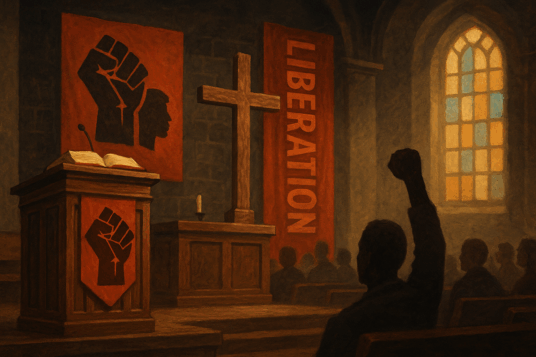Churches are not overtaken overnight. No tanks roll in. No gunfire breaks out. The shift is subtle. This shift begins when people slowly replace biblical categories with social ones—when they turn justice into a political matter, salvation into a collective effort, and liberation into a material goal.
This is the method of liberation theology—a framework that reshapes Christianity by merging it with Marxist social theory. It was born in Latin America but has since spread throughout the West, often baptized in the language of compassion. In churches like the PCUSA, UCC, ELCA, and many seminaries, it now sits comfortably in pulpits, classrooms, and committees. Many don’t even realize they’ve adopted it. But its fruit is unmistakable.
[Read “Liberation Theology: A False Gospel Masquerading as Justice“]
The Shift Begins With Language
Liberation theology rarely storms in with bold slogans. It creeps in through redefined terms:
- Justice no longer means God’s impartial righteousness, but economic equity and identity-based outcomes.
- Love no longer means correction or truth-telling, but total affirmation of behavior and identity.
- Oppression is no longer bondage to sin, but traditional Christian ethics and authority structures.
- Liberation is no longer salvation from wrath, but deliverance from poverty, patriarchy, or capitalism.
- Inclusion doesn’t mean access to the gospel, but the removal of biblical standards for sexuality, gender, and morality.
At first glance, these words sound Christian. But over time, their meanings pull people away from Scripture and toward a gospel built on resentment, envy, and activism.
The Real Pain That Draws People In
Liberation theology doesn’t grow because people hate the Bible. It grows because it appears to care. It speaks to real suffering—poverty, racism, abuse, inequality. These are real evils in the world. And Christians, rightly, want to help. But liberation theology offers a different solution than the gospel.
Rather than repentance, it offers redistribution.
Rather than a new heart, it demands new systems.
Rather than grace, it preaches grievance.
Rather than submission to Christ, it calls for resistance to authority.
Rather than eternal salvation, it settles for temporary revolution.
It trades the cross for the crowd. It trades the wrath-bearing Lamb for the voice of the oppressed. And people fall for it because it feels righteous.
The Redirection of the Church’s Mission
In churches influenced by liberation theology, the mission begins to shift. Preaching takes on the tone of protest. Discipleship becomes activism. The gospel is reinterpreted as a message of class struggle and political liberation.
- Christ is seen not as Savior from sin, but as a political revolutionary.
- Salvation is not about reconciliation with God, but liberation from unjust structures.
- The kingdom of God is reduced to policy reform and economic equality.
The cross is minimized. Blood and wrath are avoided. Sin becomes impersonal—a feature of systems, not souls. And the Christian faith becomes a social movement rather than a spiritual transformation.
Liberation Theology’s Legacy: A Hollow Church
Many historic denominations—like the PCUSA, UCC, and ELCA—once stood on biblical ground. But by embracing liberation theology, they’ve become hollow shells. Their pews are emptying. Their leaders quote social theorists and activists more often than the prophets or apostles.
This is not a reformation; it is a replacement.
Liberation theology does not renew the Church. It guts it.
The Danger for Evangelicals Today
The danger is no longer isolated to mainline churches. Evangelical leaders, authors, and influencers have begun to adopt liberation theology language and frameworks—often unknowingly. They talk about “systems” and “privilege” more than sin, holiness, and repentance. Many mean well. But they are speaking a foreign gospel.
The apostle Paul warned of this kind of thing: “Even Satan disguises himself as an angel of light. So it is no surprise if his servants, also, disguise themselves as servants of righteousness.” (2 Corinthians 11:14–15)
Liberation theology sounds good, but is it holy, right, and just? It does not liberate. It enslaves.
Instead of understanding the spiritual war in the unseen realm, liberation theology sees an ongoing social struggle. It does not resolve, bringing peace, but fosters hostility with others.
The Church must remember what truly liberates:
Not the overthrow of earthly powers—but the power of the gospel.
Not the redistribution of wealth—but the regeneration of hearts.
Not the uplifting and inclusion of social groups—but the exaltation of Christ.
